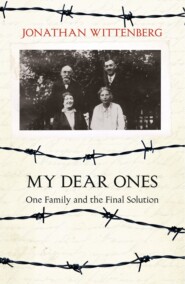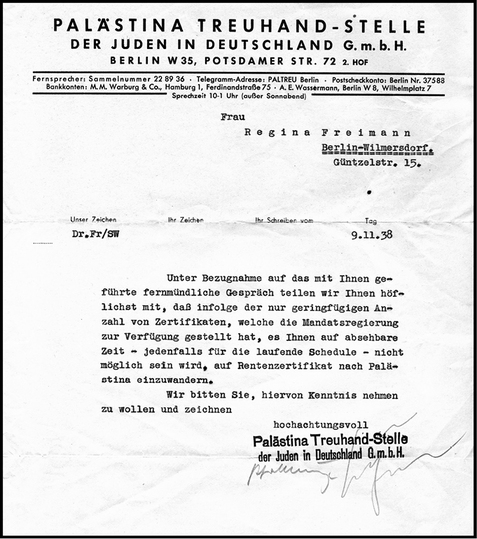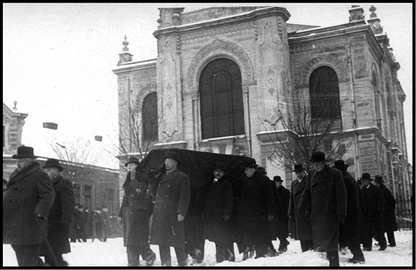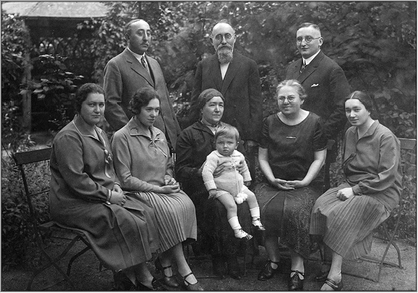
Полная версия:
My Dear Ones: One Family and the Final Solution
We ask you to take due note of this information and remain, respectfully, yours
I’ve tried to imagine to myself the morning when my great- grandmother, Regina Freimann, received that letter. She would probably have been alone when the post was delivered. Glancing through it, she would at once have noticed the sender’s address on the envelope and realised with a quiver of anxiety that this was the notification for which she had so urgently been waiting. All the family, but most especially her son Alfred, who had done so much to encourage her to submit the application, would be concerned to know the outcome.
The letter would have reached her at her relatively new address on the Güntzelstrasse in the Berlin district of Wilmersdorf; it was not long before then that she’d had to leave her previous home in the beautiful Oranienburgerstrasse, a few houses down from the magnificent synagogue which, with its gold cupola, dominated the street. Probably that gracious flat had come with the position; as Rav and Av Bet Din, rabbi and head of the rabbinical court, her husband Jacob Freimann would have been looked after well by the community. But some months after his death his widow would have had to vacate the home they had shared together for close to ten productive but challenging years since they had come here from Poznań in 1928. To be selected to lead the rabbinical court in Berlin, a city with a large and influential Jewish community of over a hundred thousand souls, was a crowning mark of honour for a man whose Jewish legal and religious decisions were respected throughout Europe and beyond. No one could then have predicted how swiftly and insidiously National Socialism was gaining strength or how soon the fragile Weimar Republic would collapse.

Letter to Regina Freimann from the Palästina Treuhand-Stelle.
The letter was sent from the offices of the Palästina Treuhand-Stelle der Juden in Deutschland, G.m.b.H (The Palestine Trust Company on behalf of the Jews of Germany Ltd). All applications for visas to Palestine had to be directed through its offices and were handled by its staff. They were expert not only in the intricacies of trying to leave Germany, but in the demands and conditions of the British Government which had effectively been ruling Palestine since 1918 under a United Nations mandate, due to expire in 1948. Beneath the stamp of the Palästina Treuhand-Stelle was an indecipherable signature, which only added to the bureaucratic impersonality of the message.
It was not an auspicious date on which to receive such news; the letter must have arrived in the immediate aftermath of Kristallnacht (9–10 November 1938). Now referred to in Germany as the Reichspogromnacht so as to avoid using the National Socialist expression, to most Jews this vicious and violent explosion will always be known as Kristallnacht (the Night of the Broken Glass), the date on which the true intent of the Nazi regime and its grip over the German and Austrian populations was revealed with a naked and grasping brutality which shattered irreparably the notion that life for the Jews could ever return to normal. Among the synagogues burnt down, Jewish premises destroyed and shops smashed and looted were the offices of the Palästina Treuhand-Stelle itself on the Meineckerstrasse. ‘In Berlin, 5, then 15 synagogues burn down. Now popular anger rages … It should be given free reign,’ Joseph Goebbels, the Nazi Minister for Propaganda who was largely responsible for instigating the violence, recorded in his diary.1 The outburst, he explained, was simply the outpouring of the kochende Volksseele, a spontaneous expression of boiling popular feeling. He himself had given personal orders that the main Berlin synagogue on the Fasanenstrasse was to be destroyed. That night and over the following days tens of thousands of Jewish men were arrested and many murdered. It must have been a terrifying moment in which to learn that the key document on the obtaining of which one’s chief hopes of leaving Germany rested was not to be forthcoming.
I have held that letter in my hand and stared at it many times. For my great-grandmother, it amounted to a death warrant. This was not, of course, literally the case. But the rejection of her application by the Mandate authorities at that critical time led her to make practical decisions which, while perfectly rational and probably the best choices she could have made in the circumstances known to her at the time, would prove with hindsight to have sealed her fate. Three days later, at a meeting chaired by Hermann Göring, Reinhard Heydrich, then head of the Security Police and subsequently directly responsible for the policies which led to Regina’s murder, suggested that an agency be created under Nazi leadership to put into effect a nationwide policy to remove the Jews from the Reich. The chain of offices he created, with branches in Vienna and later in Prague with Adolf Eichmann at their head, would in fact lock the door against any chance of escape and rob hundreds of thousands of their possessions, hopes and lives. On the same day a fine of a billion marks was imposed on the Jewish community as punishment for the damage they had ‘caused’ on Kristallnacht.
In the event though, Regina was not at home in Berlin on the morning of 10 November. She was in fact in Frankfurt, helping her son Ernst and his wife Eva, who was in her ninth month of pregnancy with their fifth child.
When eventually Regina did open the letter she must have felt profoundly alone with the bad news. To whom could she turn? Whom could she phone to share the contents of that brief note and discuss what to do next? Among the papers in the bag I found in the old trunk were a number of telephone bills, but they carried no itemised list of calls or of the dates on which they were put through, so they were sadly of no use in discovering whether she still had a network of relatives and friends in the city. She may also have been aware that the phones were probably tapped and would have been cautious of sharing news over the telephone on such a delicate subject as emigration. The text of a telegram testified to her deep anxiety: ‘Palästina-Amt total versagt. Hilfe dringend gebraucht’ (‘the Palestine Office has let us down completely. Help urgently needed’). But the message wasn’t dated and was probably not her first, immediate response; it was sent by her and Sophie, her eldest daughter, together, and Sophie didn’t travel from Czechoslovakia to join her mother in Berlin until a few weeks later.
Of her six children, three had already fled Germany. Alfred, the youngest, was the first to leave, in 1933; Wally had followed him to Palestine in 1937. Ella, my grandmother, went later that same year. My grandfather, Robert, owned a timber mill in Rawitsch, a small town near Breslau. The city was the centre of one of the most swiftly Nazified regions in Germany and had a particularly vicious local leader. Tipped off by a German official that he was high on the Gestapo’s list, Robert took his family and fled the city that same night. ‘We laid the table as if we were planning to return very soon and packed just one small bag each so that nobody would be suspicious. Then we left for ever,’ my father recalled. He put the place so far behind him emotionally as well, at least at a conscious level, that he never, to the best of my memory, even mentioned to his children the address at which he had lived.
Regina’s other three children were still in Europe. Sophie had married and stayed in Holleschau, the small Moravian town where her father had served as rabbi for twenty years. After the collapse of the Austro-Hungarian Empire in the First World War it became part of Czechoslovakia and was renamed Holešov. Trude lived in Poznań, the second of Jacob Freimann’s major rabbinical positions. Ernst, the only other son, a doctor in Frankfurt-am-Main, was closest in distance to Berlin. But, thanks to the Gestapo, he was in no position to help his mother. In fact, Regina, a pious and selfless woman whose first thoughts were always for her family, was almost certainly much more worried for Ernst and his wife and children than she was about herself.
More than anyone, though, Frau Dr Regina Freimann, as she was formally addressed on the envelopes of the letters, must have missed the presence of her husband. It was less than twelve months since he had died, suddenly, on 23 December of the previous year, while they were travelling to celebrate Sophie’s twenty-fifth wedding anniversary in Czechoslovakia. He had been suffering from high blood pressure for a number of years and had already experienced several strokes. He was taken ill while on the train and died in the early hours of the following day in a hotel in the mountain resort of Spindlermühle.
A separate bundle inside the bag in the trunk contained letters and receipts pertaining to his funeral. Throughout 1938 Regina naturally remained preoccupied not only with the emotional but also with the practical aftermath of her husband’s death. She had carefully kept all the relevant papers. A bill for two night-time visits showed that the local physician, Dr Franz Kindler, had twice been in attendance. There had evidently been nothing he could do to save the ailing rabbi’s life. It may indeed have been a mercy that death came swiftly. A quote from Gustav Fischer’s funeral services, based in Hohenelbe in the mountains of northern Czechoslovakia, itemised the expenses involved in the collection and transportation of the body, including the price of the coffin, the cost of procuring essential documentation, and smaller amounts for sundry telephone calls and telegrams. There were bills and receipts from the Burial Society and the Jewish Community of Holleschau, who provided the plot in the cemetery and supervised the actual funeral. A separate invoice from Leo Klein of the same town showed that there had been five Sterbe-Wäscher (washers of the dead), members of the Sacred Society privileged with the task of conducting the ritual preparation of the body and dressing it in the plain white linen vestments in which Jews are traditionally buried. A further list gave the costs of these garments, as well as of the sheets in which the body was cleaned and dried.
On a more mundane level, there were bills from the hotel in Spindlermühle, as well as from the establishment where they later stayed in Holleschau itself. The former listed every item separately: cups of coffee and tea, even a glass of cognac, no doubt badly needed, as well as linens, and four candles, probably for placing by the head of the dead man as Jewish tradition required. A receipt from the Prager Tagblatt (the Prague Daily) dated 30 December indicated that the family must have listed their loss in the then equivalent of its ‘hatched, matched and dispatched’ column. Strikingly, the bill for 400 thank-you cards and envelopes was dated earlier, 28 December. Overwhelmed by the numerous letters of condolence with which they would have been inundated, the family must have turned their attention quickly to how they would manage to acknowledge them all. Each major expense was carefully recorded by Josef Redlich in a letter he later sent to his wife Sophie, who had followed her mother back to Berlin after the period of ritual mourning was over. It was on account of their twenty-fifth wedding anniversary that everyone had gathered in Moravia. But instead of celebrating, they, as the wealthiest members, seem to have marked the occasion by defraying the costs of this family tragedy. ‘My dear Sopherl,’ he wrote, before proceeding to detail the various amounts including both those for which he had receipts and those for which no acknowledgement could normally be expected. One of the more substantial items was the distribution of 400 kroner to the local poor, prior to the commencement of the funeral service.
It had been Rabbi Freimann’s wish that he be buried according to traditional rites and without undue fuss in the Jewish cemetery closest to the place where he died. In the event, he was interred in Holleschau, which probably wasn’t the nearest orthodox burial ground but lay close enough to Spindlermühle and recommended itself both because it had been the seat of his longest rabbinical incumbency and because his daughter and son-in-law still lived there and could take care of the practical arrangements and later look after the grave. At any event, his body was not taken back to Berlin; had he died there he would surely have been laid to rest in the Sonderfeld, the special section of the vast Weissensee cemetery. It was there, amid the elaborate memorial chambers, that some hundreds of Jews, the starving and spectre-like living dead, managed to conceal themselves from the Nazis among the tombs and mausoleaums of the blessed dead in their eternal peace.
Rabbi Freimann was laid to rest in Holleschau’s Jewish cemetery on 26 December 1937, on a freezing winter’s day, next but one to the grave of Rabbi Shabbetai Hacohen, known after his initials as the Shach, the illustrious commentator to the key sixteenth-century code of Jewish law, the Shulchan Aruch, and also a former leader of the local community, who had been buried there in 1663. One of Rabbi Freimann’s most important rabbinical tasks had been to deliver a learned lecture each year on the anniversary of the Shach’s death, in which he shared the latter’s teachings with the many scholars who came to visit his tomb. The field, with its tall gravestones and old funeral hall decorated with murals, remains undisturbed to this day.
Many people from all around the world attended the funeral of Rabbi Freimann, that is, those who were able to get to Holleschau. The ceremony reflected the great love and high esteem in which this towering figure was held … The practice of all the traditional rites by the Chevra Kaddisha of Berlin, as well as the active participation of many rabbinical figures from our city, ensured that the parting from our teacher was conducted with due simplicity and ceremony.2
‘Those who were able to get to Holleschau’ included neither Rabbi Freimann’s older son Ernst, to whom the Nazis refused permission to leave Germany, nor his younger son Alfred, who observed the traditional mourning rites in Palestine together with the two of his sisters who by now also lived there. Regina would have been comforted by her other daughters, Trude and Sophie. Photographs shown to me by my father portrayed a long procession of men and women dressed in thick black coats and hats following the coffin on foot through the deep snow.
Ernst and his wife Eva wrote from Frankfurt:
It’s terribly hard that we’re not able to be with you. I had always believed that whatever happened we would be able to be together at once, but now there are mountains in between. Last time I parted from you, dear Mama, your heart was so heavy.
Did that final line indicate that Regina was well aware of the risk of a further stroke and afraid that something just like this might suddenly happen to her husband? Or was her mood occasioned by the terrible times?

Rabbi Jacob Freimann’s funeral procession outside the synagogue in Holleschau.
A few days later Ella, my grandmother, wrote from Jerusalem; she had been waiting to hear more about the funeral:
Dear Mama,
We still can’t comprehend the great misfortune which has overtaken us … We are constantly with you all in our thoughts. It’s a relief to know that Trude was with you, dear Mama. All through these days we’ve been longing for news from you. Of course you won’t be wanting to make any decisions right now, but it would be good if you would join us here in Jerusalem. Annchen wrote to us about how loving and attentive Sophie and Josef have been. This is a great comfort to us who are so far away.
A host of documents indicated that Regina spent much of the following months settling bills and dealing with the numerous administrative demands which follow any death, a painful task made all the more difficult by the hostile attitude which will have permeated most of the bureaucratic circles with which she had to deal. A copy of the will indicated that the couple had agreed that they would inherit each other’s possessions and that, upon the death of the second partner, their fortunes would be divided equally among their six children. On 14 February 1938 Regina had to declare for the purposes of any potential tax liabilities that they had six adult sons and daughters of their own and no further step- or adopted children. She was required to provide addresses for all of them, a circumstance which was to prove invaluable to me in attempting to uncover the traces of their lives seventy-five years later.
At the same time as she was coping with the paperwork resulting from her husband’s death, she also had to prepare a thorough inventory of her household possessions in readiness for shipping them to Tel Aviv, where, despite various hesitations, she hoped to go to escape Nazi Germany and rejoin the three of her children already in Palestine. Such lists were demanded by the Nazi authorities from anyone seeking to emigrate.
Amid all these pressing practical concerns Regina also had to make urgent decisions about her future. A letter to Alfred in Jerusalem from a family friend who was also a member of staff of the Palestine Office indicated that she was struggling to make up her mind what to do. That her preferred option was to go to Palestine was not in doubt. Her husband had firmly believed that God would redeem the divine promise and bring about the long-delayed return of the Jewish people to its ancestral land. But he was now dead and Regina had to face the future alone. The Jewish community agreed to forward her widow’s pension to Palestine if her application to emigrate were to prove successful, and the proposed sum of 350 Reichsmarks each month was generous. But what if the international situation should deteriorate still further and the transfer of monies became impossible? Would she then find herself penniless in a strange country, dependent on her family for support? Alfred’s correspondent observed that most people were happy just to get out of Germany alive and to leave worrying about what would happen afterwards until they knew that they were safe. But Regina was clearly concerned lest she prove a burden to her children who were all now struggling to establish a new life in challenging circumstances in a land full of conflicts of its own. The last thing she wanted was to become a source of trouble to her nearest and dearest.
It would be impossible to judge whether these prepossessing concerns served to distract her from her grief, or to accentuate it. Her letters, both from this period and later, showed a selfless capacity to pass over or make light of her own sufferings. But her husband must have been in her thoughts all the time.
After all, they had been married for forty-six years. They were first cousins and had met in her parents’ home in Ostrowo, when the young Jacob, still a teenager but already an orphan, had travelled there to study Torah with her father, Yisrael Meir Freimann, the town rabbi. Regina was probably just thirteen when the man with whom she was to share her life came to live in her parent’s house. She no doubt looked up to him for his learning and diligence with proud admiration.
Back home in Holleschau, Sophie was well aware of where her mother’s thoughts lay. In a letter dated 11 July 1938 she included something special for her ‘Dearest Mama’:
The blue flowers in the envelope in the parcel grow near our dear departed Papa.

Regina Freimann, centre, surrounded by her family.
Конец ознакомительного фрагмента.
Текст предоставлен ООО «ЛитРес».
Прочитайте эту книгу целиком, купив полную легальную версию на ЛитРес.
Безопасно оплатить книгу можно банковской картой Visa, MasterCard, Maestro, со счета мобильного телефона, с платежного терминала, в салоне МТС или Связной, через PayPal, WebMoney, Яндекс.Деньги, QIWI Кошелек, бонусными картами или другим удобным Вам способом.
Вы ознакомились с фрагментом книги.
Для бесплатного чтения открыта только часть текста.
Приобретайте полный текст книги у нашего партнера:
Полная версия книги
Всего 10 форматов



